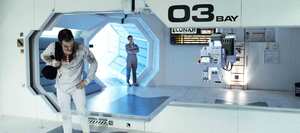Film attempts fresh perspective yet fails to take off

Moon unit · “Moon” follows astronaut Sam Bell (Sam Rockwell) and his lonely plight in outer space. A British independent production, “Moon” is directed by Duncan Jones, who is the son of legendary musician David Bowie. The film also stars Academy Award-winner Kevin Spacey. - Photos Courtesy of Liberty Films
Imagine waking up with bright lights above you and a terrible headache. A robot greets you as your heavy eyelids flutter open, and that robot’s steady voice sounds an awful lot like Kevin Spacey.
This recurring experience is a common motif in “Moon,” a British independent film starring both the voice talents of Spacey as Gerty the robot and Sam Rockwell as lonely astronaut Sam Bell.
Director Duncan Jones, David Bowie’s first son, puts a steady focus on Rockwell’s character, crafting a story that is part “Castaway,” part “Blade Runner” and a whole lot of philosophy. Bell, the sole groundskeeper for moon station Sarang, has an important job: to make sure his station takes care of the harvesters gathering the precious H3 on the dark side of the moon in order to fuel Earth’s practical needs.
His private contract lasts three years, and his only companion is a painfully polite robot attached to the ceiling who emotes using a screen with an animated smiley face on it. To pass the time, he whittles a tiny model of Fairfield, Conn. out of wood, runs on the treadmill and tapes messages to his wife and daughter.
Even in all of its proximity, the moon’s broken satellite has barred live communications between Sarang and a forlorn Bell who yearns for human contact.
Two weeks before Bell’s return to Earth, however, unnerving things begin to occur. His head starts to throb, he begins to hallucinate and he gets into a terrible moon rover accident. When he comes to, a younger version of himself is there, determined to figure out why there are two of them.
“Moon,” from the general synopsis, may seem a bit thriller in its genre, but in reality it’s more of a thoughtful exploration of the meaning of identity. Jones’s ambitious effort to combine science fiction with relatable themes of humanity, identity and memory are a far cry from the special-effects whirlwinds that many studios offer to fill the sci-fi void.
Audience members won’t be able to root for a light saber-toting Bell that valiantly stabs the heart of green space beasts to save the pretty princess. He instead bleeds, limps and questions himself in an isolated space box that does not glamorize the industrial nature of his purpose there. “Moon” does a surprisingly stellar job of making a highly personal, quiet sci-fi film that does not drag on in details nor cover up plot holes with silly noises and lights. Sure, there are logistical science questions, but those are forgivable — “Moon” isn’t about the moon, but the man who has chosen to live there.
The moon turns from the first human connection to a mysterious and awesome space into a desolate island in which men lose and doubt themselves for the sake of the rest of humanity. It is a necessary mine, an airless Siberia with static white walls that recall dirty, utilitarian versions of the cars in Disneyland’s Space Tours ride.
Rockwell’s performance, however, does not echo the minimalism of his quarters. Rather, his interpretation of the two Rockwells, one tortured and decaying, the other hot-tempered and determined, hints at an actor that has the power to make viewers uneasy in a good way, questioning their own inner paradoxes and conflicts.
Rockwell is essentially the sole character, the embodiment of the entire plot throughout the movie, and his presence is at once captivating and holds a high level of interest, despite the sometimes abstract and subtle nature of “Moon.”
Even though the climatic plot twist might surprise those same viewers, it also offers an unfortunately predictable resolution that turns what could have been a thoroughly different film into an indie “WALL-E” without the adorable “Hello, Dolly!” soundtrack.
The cliché bad guy here, of course, is Lunar Industries, a global corporation that will stop at nothing to continue a profit, even if it means streamlining human life — if you consider a clone a human.
Duncan’s choices to make “Moon” so visually drab — swatches of gray, muted colors and a space station that looks like it has actually seen some work — drives his ecologically minded, anti-corporate, identity-searching point into the ground using a setting loftier than the imagination. The moon isn’t a thing of wonder and beauty, possibility and hope, but a place of self-discovery, even that of a sinister nature.
The moon, after all, was the first and only space body that humans actually touched. A decade into the next century, astronauts still have not walked on other celestial bodies.
“Moon” seeks not to question the science, but instead, the psychology of that — and though it tries its very best, the film only makes it to orbit. There’s no transcendental, intergalaxy rush at the end, but only the lonely, lovely whoosh of ships that have been there before.
